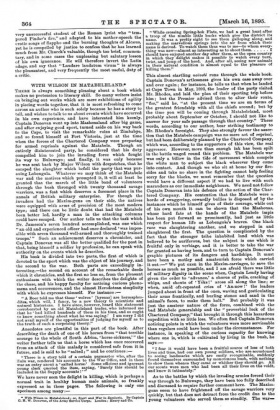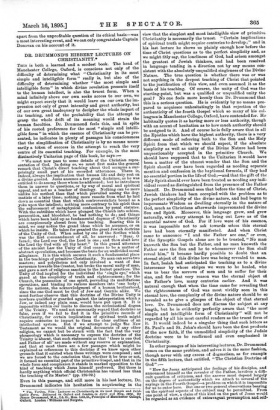WITH WILSON IN MATABELELAND.* THERE is always something pleasing about
a book which makes no pretension to literary skill. So many writers insist on bringing out works which are mere exhibitions of agility in piecing words together, that it is most refreshing to come across an author who is such solely because he has a story to tell, and wishes to talk to us about events which have occurred in his own experience, and have interested him keenly. Captain Donovan went up into lifashonaland after big game, and after enjoying good sport, turned aside on his way back to the Cape, to visit the remarkable ruins at Zimbabye, and so found himself at Fort Victoria, just at the time when the forces of the Chartered Company were preparing for armed reprisals against the Matabele. Though an entirely disinterested party, he considered that his duty compelled him to join the invading force which fought its way to Bnluwayo ; and finally, it was only because he was sent back by Major Wilson with despatches, that he escaped the slaughter which befell the party that was pur- suing Lobengnla. Whatever we may think of the Matabele war and the motives which prompted it, it will at least be granted that the march of the little band of volunteers through the bush thronged with twenty thousand savage warriors, was a feat which deserves a foremost place in the annals of British military enterprise. For though the invaders had the Maxim-guns on their side, the natives were equipped with arms of precision of the most modern type; and there can be little doubt that had the Matabele been better led, hardly a man in the attacking columns could have escaped. Our author tells us that the task which Dr. Jameson's seven hundred accomplished, was one which "an old and experienced officer had once declared was impos- sible with seven thousand well-armed and thoroughly trained troops.'" Such an achievement deserves a chronicler, and Captain Donovan was all the better qualified for the post in that, being himself a soldier by profession, he can speak with authority on the events which he describes.
His book is divided into two parts, the first of which is devoted to the sport which was the object of his journey, and the second to the war. Both parts are exceedingly in- teresting,—the second on account of the remarkable deeds which it chronicles, and the first no less so, from the pleasant enthusiasm with which the writer describes the delights of the chase, and his happy faculty for noticing curious pheno- mena and occurrences, and the almost Herodotean simplicity with which be expresses himself. For instance :—
"A Boer told me that these 'wolves' [hyenas] are hermaphro- dites, which will, I fancy, be a new theory to scientists and natural historians. I have since, however, heard this statement corroborated by an old Matabeleland trader, who informed me that he had killed hundreds of them in his time, and so ought to know something about what he was saying.' I am sorry I did not avail myself of the opportunities of judging for myself as to the truth of such a surprising theory."
Anecdotes are plentiful in this part of the book. After describing the death of one of his horses from "that terrible scourge to the whole of South Africa, horse-sickness,' " the writer further tells us that a horse which has once recovered from an attack of this malady is considered safe from it in future, and is said to be " salted ; " and he continues :—
" There is a story told of a certain paymaster who, after the Zulu war, rendered his accounts to the War Office, and in them was an entry anent a salted horse.' Some officious and ignorant young clerk queried the item, saying, Surely this should be included in the Supply accounts !
We have never seen the delight in killing, which is perhaps a normal trait in healthy human male animals, so frankly expressed as in these pages. The following is only one specimen among many :—
• With Wuson in Matabeleland ; or. Sport and War in Zambesia. By Captain C. R. W. D0110•8111, of the Army Service Corps. London ; Henry and Co. "While crossing Spring-bok Plats, we had a great hunt after a troop of the nimble little bucks which give the district its name. It was a pretty sight to see them galloping along, and making the marvellous springs into the air from which their name is derived. To watch them thus was to me—to whom every-
thing was new—almost as interesting as to shoot them should have enjoyed another day after them, as the open country in which they delight makes it possible to watch every turn, twist, and jump of the herd. And, after all, seeing new animals in their natural condition is almost equal to the pleasure of killing them."
This almost startling naiveli runs through the whole book.
Captain Donovan's artlessness gives his own case away over and over again ; for instance, he tells us that when he landed at Cape Town in May, 1893, the leader of the party visited Mr. Rhodes, and laid the plan of their sporting trip before him ; but the Premier advised them to alter their route, "for," said he, "at the present time we are on terms of
the greatest friendship with all the chiefs around; but by the time you will be coming through Matabeleland, most probably about September or October, I should not like to answer for your safe passage through that country." These
words, according to our author, bear striking testimony to Mr. Rhodes's foresight. They also strongly favour the asser- tion that the Matabele campaign was no mere act of reprisal, but had been deliberately planned by the Chartered Company, which was, according to the supporters of this view, the real aggressor. However, more than enough ink has been spilt in the battle waged round this problem. The Matabele war was only a billow in the tide of movement which compels the white man to subject the black wherever they come into contact. And though we who sit at home by our fire- sides and take no share in the fighting cannot help feeling sorry for the blacks, we must remember that the question would have a different aspect if we had to live with such marauders as our immediate neighbours. We need not follow Captain Donovan into his defence of the action of the Char- tered Company. His contention that the Matebele were a horde of swaggering, cowardly bullies is disposed of by the instances which he himself gives of their courage, while out of his own mouth it can be shown that the Mashouas, whose hard fate at the hands of the Matabele impis has been put forward so prominently, had just as little respect for human life as Lobengula's braves. One black race was slaughtering another, and we stepped in and slaughtered the first. The question is complicated by the fact that the stronger tribe inhabited land which was believed to be auriferous, but the subject is one which is fruitful only in verbiage, and it is better to take the war
for granted as having been, and to turn to Captain Donovan's graphic pictures of its dangers and hardships. It must have been a motley and amateurish force which carried it out :—" We put oxen in the Maxim-carriages, to save the horses as much as possible, and I am afraid there was little of military dignity in the scene when, Captain Lendy having given the order to advance,' a chorus of yells, cracking of whips, and shouts of Yeks !' arose all along the line; or when, amid oft-repeated cries of 'An-now!' the leaders jumped about in front of the oxen, waving and gesticulating their arms frantically, and hurling stones and sand in the animal's faces, to make them halt." But probably it was just the amateur nature of the force, combined with the bad Matabele generalship and the "proverbial luck of the
Chartered Company," that brought it through this hazardous expedition with so little loss. We often find Captain Donovan noticing points in which the volunteers were more serviceable than regulars could have been under the circumstances. For instance, in speaking of the curious capacity for knowing where one is, which is cultivated by living in the bush, he says :—
"I fear it would have been a fruitful source of loss of both lives and time, had our own young soldiers, who are accustomed to seeing landmarks which are easily recognisable, suddenly found themselves surrounded by monotonous bush, with nothing to show them whence they came or whither they should go. All our scouts were men who had been all their lives on the veldt, and knew it intimately."
As to the battles by which the invading armies forced their way through to Bulnwayo, they have been too fully described and discussed to require further comment here. The Maxim- guns seem to have frightened off the savage warriors very
quickly, but that does not detract from the credit due to the young volunteers who served them so steadily. The war.
apart from the unprofitable question of its ethical basis—was a most interesting event, and we can only congratulate Captain Donovan on his account of it.



































 Previous page
Previous page